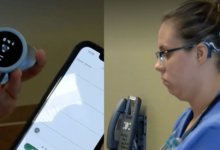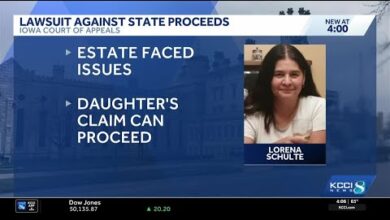Nurses warn of ‘postcode lottery’ for NHS ear wax removal

Ear, nose and throat (ENT) nurses have criticised the “postcode lottery” of access to free NHS ear wax removal, as a new report has revealed that almost 10 million people in England do not have access to these services.
New research from the Royal National Institute for Deaf People (RNID) has this week revealed that less than half of integrated care boards (ICBs) are providing wax removal services.
An estimated 2.3 million people in the UK require professional ear wax removal every year.
Previously, people were able to get ear wax removal done at their local GP surgery, usually by a practice nurse.
However, a 2022 report from RNID found that two thirds of people with ear wax build up were told the service was no longer available to them on the NHS.
Now, the latest piece of research by the charity has revealed the extent of the postcode lottery that exists for patients trying to access ear wax removal services.
Freedom of Information requests submitted by the charity to all 42 ICBs in England showed that only 18 fully commissioned ear wax removal services in line with guidelines from the National Institute of Health and Care Excellence (NICE).
Meanwhile, 15 ICBs partially commissioned services, with the majority providing ear wax removal “within limited areas” of their geographical remit.
RNID warned that, even in places where the service was commissioned, not all GP practices choose to deliver it.
The charity also found that seven ICBs do not commission ear wax removal services at all, which it warned had left 9.8 million people completely without access on the NHS.
Natasha Lucas, a specialist ENT nurse at University Hospitals Derby and Burton NHS Foundation Trust, told Nursing Times that she had seen the consequences of the disparity in services in the area where she works.
She said: “There are some good GP practices out there that will attempt the ear wax removal, and only refer to us if they’re struggling or have any other issues.
“But then, as far as I hear from patients, some GP practices just do not offer it.”
Ms Lucas warned that some GP practices were “trying to push patients into the private sector” to get wax removed, which can be costly.
Failing that, some patients have attempted to remove the wax themselves which, if done incorrectly, can cause infection, permanent hearing loss and ear canal or ear drum damage.

Natasha Lucas
Ms Lucas warned that if ear wax is left to build up, then it can cause issues like hearing loss, pain and tinnitus.
She said: “I think whilst it seems like quite a minor issue, obviously it then has quite a lot of knock-on effects on other things.
“So actually dealing with it at the point where it’s just a little bit of ear wax, stops all these extra issues appearing.”
This was echoed by Hilary Harkin, a specialist ENT nurse at Guy’s and St Thomas’ NHS Foundation Trust.
She told Nursing Times: “I think people unfortunately say ‘it’s just wax’, it’s not, it is a potential for infection.
“It reduces your hearing, it can cause balance problems, it can cause tinnitus, it causes hearing problems, so actually it’s a very significant thing.”
Ms Harkin warned that not only was there sparse provision of ear wax removal in GP surgeries, but there was also little provision in hospitals.
“It’s a shocking state of affairs,” she said.
“If you have an inpatient with wax it’s tough.”
Ms Harkin said, in some cases, people on an inpatient ward were having to pay for a nurse from outside the hospital to come in and remove their wax because the hospital did not have any wax removal services.

Hilary Harkin
“I have friends at other trusts and they will get a family to pay money to get a district nurse or practice nurse to come in and syringe somebody’s ears while they’re an inpatient.
“How can that be allowed and be deemed acceptable?”
In its report, the RNID has called for “urgent government intervention” to ensure that patients with a medical need for ear wax removal have access to the service on the NHS, regardless of where they live.
In addition, it has urged health commissioners to “examine different ways of delivering the service through primary and community care”.
Meanwhile, the charity has also called on NHS England to improve its information about how patients can manage ear wax build up.
Victoria Boelman, director of insight and policy at RNID, said: “There is no medical reason for the withdrawal of this vital service, which is essential for 2.3 million people in the UK.
“This report exposes a horrifying reality for thousands of people being let down by commissioners who are neglecting public health guidelines.”
Responding to the report, a Department of Health and Social Care spokesperson said: “Audiology services that would carry out ear wax removal are delivered by local integrated care boards, who ensure provision of services that meet the needs of patients in their area.
“GPs can also refer patients where a build-up of ear wax is linked with hearing loss.”
Meanwhile, an NHS England spokesperson said: “The NHS has information available online at nhs.uk regarding ear wax safety and people can go to their local pharmacy for advice over the counter.
“While integrated care board commissioning teams should ensure that information about ear wax removal services is made available locally so that patients can be signposted or referred to the most appropriate NHS services where symptoms persist following self-care methods.”







